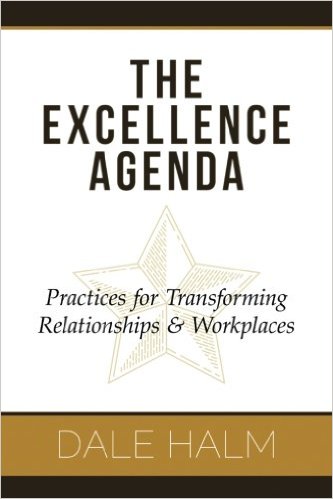Excellence Agenda
Practices for Transforming Relationships & Workplaces
Are you creating excellence in your relationships, in your workplace? This book will forever change how you approach working with others. In The Excellence Agenda, Dale Halm author and renowned business consultant, explores what it takes to truly excel. It reveals the mindset and behaviors needed for optimal performance. By offering a series of thought-provoking questions, this book provides a powerful roadmap for success. It includes:
- The Success Paradigm – alternative ways of thinking that foster collaboration
- Breakthrough Practices – crucial behaviors that lead to exceptional results
- Tools – guidelines for mastering the skills of excellence
- Excellence Survey – 20 questions to help you assess your ability to excel
The Excellence Agenda will inspire you to transform your relationships and workplace.
Featured Posts
November 10, 2022 | Dale Halm
Responsibility - The Foundation for Excellence
Many organizations struggle with creating a culture of excellence. Where do you start? What should you focus on? What practice is fundamental to success? The answer is - responsibility. This is the state of being the person who caused something to happen.
English-born writer and former editor-in-chief of Simon & Schuster Michael Korda said, "Success on any major scale requires you to accept responsibility. In the final analysis, the one quality that all successful people have is the ability to take on responsibility."
Without people taking accountability for their actions, all other attempts to produce a high-performance organization will have limited impact. Responsibility as a core component of effectiveness has been underscored by experts in business, education, and community development for decades. Yet, when most companies attempt to establish a culture of excellence, they tend to reach for complex solutions. The best improvement program or newest change initiative will fail if people don't ultimately assume responsibility for its success. That is why responsibility is the first discipline and serves as the building block for achieving excellence.
When you look deeper into what being responsible means you discover that it centers on being accountable for your actions. It means being liable and answerable. When you take total responsibility, you fulfill your obligations; it is a duty to take care of something. You pursue solutions, regardless of circumstances. There is no room for excuses or protesting why things aren't progressing as planned. It is doing what needs to be done. If there is a misunderstanding, resolve it. If a project is behind schedule, negotiate a solution. If goals are unclear, proactively work with others to clarify them. This is being responsible for how you manage challenges and contribute to the success of the organization. Responsibility invites you to look at how your actions affect others. It calls your attention to how you choose to respond to life's demands.
Denis Waitley, motivational speaker and consultant, captured the essence of responsibility perfectly when he said, "There are two primary choices in life; to accept conditions as they exist, or accept the responsibility for changing them."
Being responsible means living independent of circumstances, not letting them dictate your response. It is about learning from things instead of fighting against them. You take accountability for how things occur in your life instead of shifting blame to others or dismissing things you don't agree with.
Author and consultant Peter Block uses a model called "Six Conversations" to engage people in discussing alternative futures. One of the conversations called Ownership focuses on whose organization or task is it. It asks people, "How have they contributed to creating the current reality?" This is the essence of responsibility – owning the choices you make and the actions you take.
If you want to see responsibility in action, fly Southwest Airlines. Notice the efficiency of quick turnaround times in and out of airport gates, and crews (from baggage handlers to flight attendants) that positively influence the customer's experience. Each employee takes responsibility for helping achieve the company's purpose. Their mission is dedication to the highest quality of customer service, delivered with a sense of warmth, friendliness, individual pride, and company spirit. By continuously modeling responsibility, Southwest Airline employees establish a solid foundation for excellence. As Winston Churchill profoundly noted, "The price of greatness is responsibility."

